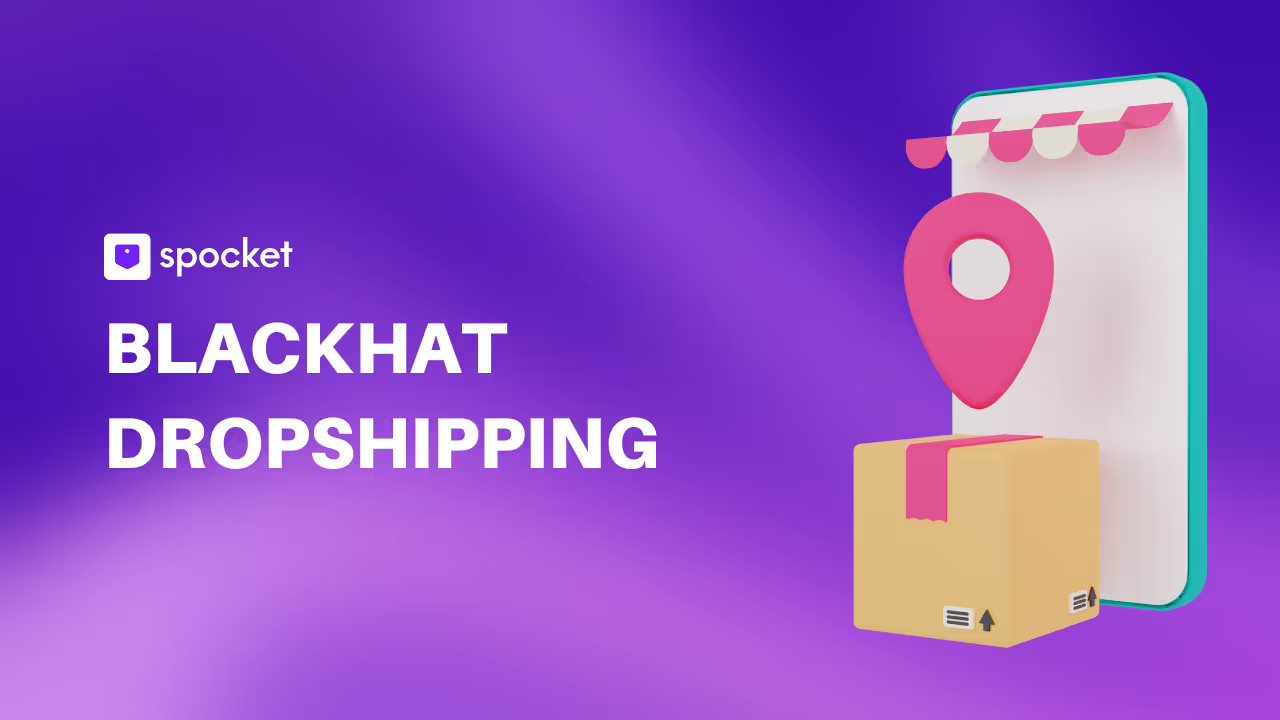Blackhat Dropshipping
Learn about blackhat dropshipping, its risks, and discover ethical alternatives to build a sustainable dropshipping business with platforms like Spocket.


In recent years, dropshipping has become one of the most popular ways to start an e-commerce business with minimal upfront investment. While many people are familiar with traditional, or "whitehat," dropshipping methods, there's a more controversial side of the business: blackhat dropshipping. This method involves using tactics that often violate platform policies or ethical guidelines to generate revenue quickly. While it might seem like an appealing shortcut, blackhat dropshipping comes with substantial risks.
In this comprehensive guide, we’ll explore what blackhat dropshipping is, the tactics commonly used, and the potential legal and ethical issues. We’ll also discuss strategies to manage risks and offer advice for those considering this risky approach to e-commerce.
What is Blackhat Dropshipping?
Blackhat dropshipping refers to the use of unethical or questionable tactics in a dropshipping business to maximize profits. This can include manipulating traffic, exploiting loopholes in e-commerce platforms, and deceiving customers. Unlike whitehat dropshipping, which follows platform policies and ethical business practices, blackhat tactics are designed to exploit systems for rapid growth.
How Blackhat Differs from Whitehat Dropshipping
In whitehat dropshipping, businesses focus on legitimate growth strategies like search engine optimization (SEO), influencer marketing, and delivering quality customer service. On the other hand, blackhat dropshipping relies on manipulating algorithms, faking reviews, and using shady marketing techniques to gain a competitive edge quickly. While whitehat tactics take time to yield results, blackhat methods often lead to faster profits but come with a much higher risk of getting banned by platforms or facing legal action.
Why Do People Use Blackhat Dropshipping?
While the ultimate goal of using blackhat dropshipping is to gain immediate sales, there are other reasons also explaining why people use blackhat dropshipping
Perceived Advantages
Blackhat dropshipping is appealing to some because it appears to offer quick profits with minimal effort. The main advantages people see in this method are:
- Quick Profits: With blackhat tactics, sellers can make money without investing in inventory or high-quality products.
- Low Investment: There’s less concern with finding reputable suppliers or managing a product inventory.
- No Accountability: Since sellers don’t hold physical products, they feel they can dodge responsibility for customer complaints.
Immediate Gains vs. Long-term Consequences
While blackhat dropshipping can lead to short-term profits, the long-term consequences can be severe. Here’s what you risk:
- Unhappy Customers: Poor-quality products and long shipping times result in negative reviews and chargebacks.
- Unsustainable Business: This approach is often a “get rich quick” method that doesn’t hold up over time. Eventually, account bans and legal issues catch up, shutting down the business.
Common Blackhat Dropshipping Tactics
There are several blackhat techniques that dropshippers use to accelerate their business growth. These methods often violate terms of service agreements on platforms like Shopify, Amazon, eBay, and Facebook Marketplace.
1. Manipulating Traffic with Blackhat SEO
One of the primary tactics in blackhat dropshipping is the use of blackhat SEO techniques to drive traffic to dropshipping stores. This includes keyword stuffing, cloaking (showing different content to users and search engines), and building spammy backlinks. While these methods can lead to a short-term surge in traffic, search engines like Google are constantly improving their algorithms to detect and penalize websites using these strategies.
2. Fake Reviews and Social Proof
Many blackhat dropshippers use fake reviews to boost the credibility of their store and products. This could involve buying fake reviews from third-party services or creating multiple fake accounts to leave positive feedback on platforms like Amazon or Shopify. Social proof, such as reviews and testimonials, plays a significant role in consumer purchasing decisions, which is why manipulating this aspect can lead to more sales.

3. Paid Traffic Manipulation
Another method involves manipulating paid traffic sources like Facebook Ads and Google Ads. Blackhat dropshippers may create misleading ads that offer products at an incredibly low price, only for customers to be upsold or misled about product quality. These ads may violate the ad platform’s policies, but because they generate quick sales, they’re often seen as worthwhile risks by blackhat dropshippers.
4. Using AliExpress and Other Low-Quality Suppliers
Many blackhat dropshippers rely on low-quality suppliers, primarily from platforms like AliExpress, that deliver subpar products to customers. While this allows the dropshipper to profit from high margins, it results in poor customer satisfaction and an influx of refunds and chargebacks. Blackhat dropshippers are often unconcerned with long-term brand reputation, as their goal is to generate as much profit as possible before their store is shut down.
5. Trademark Infringement
Some blackhat dropshippers go as far as selling counterfeit goods or using brand names illegally to deceive customers. Trademark infringement is not only unethical but also illegal, and it can lead to severe legal consequences, including lawsuits and massive fines. Despite this, blackhat dropshippers continue to use this strategy due to the high profits associated with counterfeit goods.

Legal and Ethical Concerns in Blackhat Dropshipping
Blackhat dropshipping presents a variety of legal and ethical concerns. First and foremost, violating platform policies can lead to account suspensions or bans from popular platforms like Shopify, PayPal, and eBay. More seriously, trademark violations and fraud can result in legal action against the dropshipper.
Legal Risks of Blackhat Dropshipping
- Account Suspension and Bans: Violating platform policies on Shopify, PayPal, and eBay can result in account suspensions or permanent bans, cutting off your business.
- Trademark Violations: Selling counterfeit items or products with fake branding infringes on trademarks, exposing you to potential lawsuits from the brand owners.
- Fraud Charges: Misleading customers about product quality, origin, or delivery times can be considered fraud, leading to legal action from affected buyers.
- Heavy Fines: If caught selling fake goods, you could face fines that significantly impact your finances or even result in the shutdown of business.
- Lawsuits from Brands or Customers: Brands whose trademarks you violate may sue, and customers misled by false advertising may also take legal action against you.
Ethical Considerations
- Deception of Customers: Blackhat dropshippers often use false advertising, misleading customers about the quality or origin of products.
- Exploitation of Consumer Trust: Selling low-quality or counterfeit goods damages trust, as customers expect to receive products that match the description and price.
- Customer Dissatisfaction: Customers frequently receive items that are not as advertised, leading to disappointment, frustration, and negative reviews.
- Short-term Gains Over Long-term Success: Blackhat dropshipping focuses on quick profits but sacrifices repeat business and customer loyalty, making it unsustainable.
- Building Trust: For a successful business, it’s essential to focus on transparency and deliver high-quality products, helping build a reputation that attracts repeat customers.
Driving Traffic and Conversions in Blackhat Dropshipping
Blackhat dropshippers may achieve quick results by aggressively driving traffic and manipulating conversions. These tactics can boost visibility and sales in the short term but often carry significant risks. Here’s a look at two common methods used:
Blackhat SEO for Traffic
Blackhat SEO (Search Engine Optimization) tactics aim to manipulate search engine algorithms to rank higher and attract more traffic. Here are some common blackhat SEO techniques:
- Keyword Stuffing: This involves overloading content with specific keywords to rank higher in search results. While it might work initially, search engines like Google can detect this and may penalize or de-index the site, causing it to drop in rankings.
- Cloaking: Cloaking is showing one type of content to search engines and a different one to users. For example, a website might present high-quality, relevant content to search engines but redirect users to a product page or low-quality content. This can result in penalties and a loss of trust.
- Buying Backlinks: Backlinks help sites rank higher on search engines by signaling that other websites “trust” your content. Blackhat dropshippers may buy large quantities of low-quality backlinks to improve their rankings, often engaging in buying backlinks schemes that prioritize quantity over quality. However, search engines may penalize sites with unnatural backlink profiles, potentially causing a drop in rankings.
Using Paid Traffic in Blackhat Dropshipping
Blackhat dropshippers often manipulate paid advertising channels like Google Ads and Facebook Ads to attract visitors and increase conversions. Here’s how they do it:
- Misleading Ads: Blackhat dropshippers might create ads that promise high-quality products, fast shipping, or significant discounts, but the actual products often don’t live up to these claims. This tactic draws in a high volume of clicks and traffic, but it can lead to dissatisfied customers.
- Clickbait Strategies: By using attention-grabbing headlines and images, blackhat dropshippers drive up their click-through rates (CTR), increasing the chances of conversions. For example, they may use terms like “50% Off Today Only!” or “Top-Rated Product!” to entice users, even if these claims aren’t accurate.
- Fake Scarcity and Urgency: Ads might display fake countdowns, limited stock notifications, or exaggerated claims like “only 3 left!” to create a sense of urgency. This manipulation can drive conversions by pushing customers to make impulse purchases.
- Ad Account Rotation: Blackhat dropshippers often set up multiple ad accounts to avoid getting permanently banned. If one account is flagged or banned, they simply switch to another, allowing them to continue advertising without interruption.
Managing Customer Relationships in Blackhat Dropshipping
In blackhat dropshipping, customer satisfaction often takes a back seat. This approach can lead to issues like frequent chargebacks, refunds, and negative reviews, ultimately affecting the store’s reputation. Here’s how blackhat dropshippers typically handle customer relationships:
Handling Refunds and Chargebacks
Because blackhat dropshippers often sell low-quality products, they frequently receive refund requests and chargebacks from dissatisfied customers. Here are some tactics they use to manage these situations:
- Delaying Responses: Blackhat dropshippers might take a long time to respond to refund requests, hoping customers will give up or forget about their complaints.
- Disabling Communication Channels: In some cases, they disable customer support channels like email or chat to avoid dealing with refund requests altogether.
- Using Third-Party Payment Processors: They may switch between multiple payment processors to reduce the impact of chargebacks on any one account, which makes it harder for customers to request refunds.
Avoiding Negative Reviews
Negative reviews can harm a store’s reputation and deter future customers, so blackhat dropshippers often try to prevent them. Common tactics include:
- Review Manipulation Tools: Some blackhat dropshippers use tools to filter out or hide negative reviews, making their store appear more reputable than it really is.
- Blocking Feedback: They may block customers from leaving feedback altogether, which prevents negative reviews from being posted but also raises suspicion.
- Fake Positive Reviews: To counteract negative feedback, blackhat dropshippers may create fake positive reviews or purchase them from third parties to artificially boost their store’s rating.
While these tactics can help avoid bad reviews in the short term, they typically harm the business in the long run as more customers become aware of the fraud.
Scaling a Blackhat Dropshipping Business
Blackhat dropshipping can lead to quick profits, but scaling this type of business is both challenging and risky. Here’s how they try to scale up and the obstacles they face:
Automation Tools for Blackhat Dropshipping
To handle the increased workload as their store grows, blackhat dropshippers often rely on automation tools. Here’s how they use these tools:
- Ad Management: Automation tools can create and manage ads across platforms, allowing blackhat dropshippers to reach more people without manual effort.
- Order Fulfillment: Tools that automate order placement and shipping updates can help process large volumes of sales quickly.
- Customer Communication: Automated responses are often used to handle common inquiries or complaints, but this can lead to impersonal interactions that further damage the customer experience.
However, over-reliance on automation can lead to errors, such as incorrect orders or delayed shipments, which harm the store’s reputation and lead to even more complaints.
The Challenges of Scaling a Blackhat Business
As a blackhat dropshipping business grows, it faces increasing scrutiny and challenges:
- Platform Detection: Larger businesses attract more attention, making it more likely that platforms like Shopify or PayPal will detect blackhat tactics and ban the store.
- Customer Complaints: With more customers, there’s a higher chance of complaints and chargebacks, which can lead to financial penalties or account closures.
- Legal Risks: As the business scales, so do the risks of facing legal action for fraud, trademark violations, or other blackhat practices.
Risks and Consequences of Blackhat Dropshipping
Blackhat dropshipping involves critical risks and can lead to severe consequences. Here are some of the risks and consequences you must be aware of regarding it:
Legal Risks
Blackhat dropshipping often involves selling counterfeit items or misrepresenting products. This can lead to serious legal problems, such as:
- Lawsuits and Fines: Selling fake or trademarked goods can result in hefty fines or lawsuits.
- Intellectual Property Infringement: If a seller is caught selling counterfeit items, they may face legal action from the original brand owner.
Account Bans and Platform Penalties
E-commerce platforms like Shopify, Amazon, and eBay have strict policies against blackhat practices. Here’s what can happen:
- Account Suspensions: Platforms are quick to ban accounts suspected of using blackhat tactics, which means losing all business and customer data.
- Penalties and Fees: Sellers may incur fees or fines for policy violations, and there’s often no option to appeal.
Damaging Your Reputation and Customer Trust
Reputation is everything in e-commerce. Using blackhat dropshipping can lead to a bad name in the industry:
- Negative Reviews: Low-quality products and bad customer service often result in negative reviews, which drive away future customers.
- Low Customer Retention: Blackhat dropshipping focuses on short-term gains, so customers are unlikely to return, reducing any chance of long-term success.
Is Blackhat Dropshipping Worth It?
While blackhat dropshipping can lead to fast profits, the risks often outweigh the rewards. From legal consequences to platform bans and unhappy customers, the potential for disaster is always looming.
Whether the practice of blackhat dropshipping is worth or not depends on the pros and cons related to it. Let’s have a look at its pros and cons.
Pros:
- Quick profits with low upfront costs
- Fast growth by exploiting loopholes
- Can be profitable before platforms catch on
Cons:
- High risk of getting banned by platforms
- Legal consequences, including fines and lawsuits
- Poor customer experiences leading to chargebacks and negative reviews
- Unsustainable in the long term
Ethical and Sustainable Alternatives to Blackhat Dropshipping
Following are the alternatives to blackhat dropshipping that can help you build your dropshipping business sustainable
Whitehat Dropshipping Strategies
Instead of blackhat tactics, try these sustainable dropshipping methods:
- Use Reputable Suppliers: Partner with reliable dropshipping suppliers who offer quality products, reasonable shipping times, and responsive customer service.
- Be Transparent: Provide accurate product descriptions and realistic shipping times. Honesty builds trust with customers.
- Focus on Customer Satisfaction: Prioritize customer service by responding to inquiries and handling complaints professionally.
Emphasizing Brand Building and Customer Loyalty
Creating a recognizable brand helps set you apart and encourages repeat business:
- Build a Brand Image: Use a cohesive logo, colors, and tone that reflect your business values. This helps customers remember you.
- Collect Customer Feedback: Encourage customers to leave honest reviews. Use this feedback to improve your service.
- Engage with Your Audience: Use social media and email marketing to stay connected with your customers, offering them value even after a sale.
Partnering with Reliable Dropshipping Platforms
To make ethical dropshipping easier, use platforms like Spocket:
- Find Quality Products: Spocket connects you with suppliers who offer top-notch items and faster shipping, mostly from the U.S. and Europe.
- Faster Shipping Times: With Spocket, you can offer your customers faster delivery, increasing satisfaction and encouraging repeat sales.
- Customer Support: Spocket suppliers are vetted, so you’re less likely to encounter unreliable partners.
Conclusion
While blackhat dropshipping might seem like an easy way to make quick money, it comes with serious risks, including account bans, legal trouble, and a damaged reputation. For those looking to build a successful and sustainable dropshipping business, the best approach is to focus on ethical and whitehat methods.
A great way to start ethically is by using Spocket, a dropshipping platform that connects you with reliable suppliers offering high-quality products. With Spocket, you can avoid the pitfalls of blackhat dropshipping and create a legitimate business you can be proud of. Dropshipping with Spocket offers faster shipping times, better customer satisfaction, and the potential to earn a consistent income from home..
Blackhat Dropshipping FAQs
Is blackhat dropshipping illegal?
Not all blackhat tactics are illegal, but some, like selling counterfeit products, definitely are. Even if it’s not illegal, many blackhat tactics violate platform policies and can result in account bans.
How do platforms detect blackhat dropshipping?
Platforms like Shopify, Amazon, and eBay have strict policies and algorithms that monitor suspicious activity, such as fake reviews, keyword stuffing, and trademark violations.
Can you make money with blackhat dropshipping?
Yes, but it’s risky. While you might make money quickly, there’s a high chance you’ll get banned or face legal issues, which can ruin your business in the long run.
What are the alternatives to blackhat dropshipping?
The best alternative is whitehat dropshipping, which focuses on building a sustainable, legitimate business by offering quality products and following platform rules.
What is the biggest risk in blackhat dropshipping?
The biggest risk is getting caught. Once you’re banned from a platform, it can be difficult—if not impossible—to open another store. You also risk legal action, especially if you’re selling counterfeit or trademark-infringing products.
Launch your dropshipping business now!
Start free trialRelated blogs

How to Dropship Using Squarespace
Learn how to start Squarespace dropshipping step-by-step — from setting up your store, choosing suppliers, integrating with dropshipping apps, managing orders, and marketing for sales.

Dropshipping Business License Guide for US Sellers: Legal Checklist and Permits Explained
Learn exactly what licenses and permits US dropshippers may need, how to get a dropshipping business license, sales tax permits, EIN, local approvals, and compliance steps.

How to Sell Ebooks on Amazon KDP
Learn how to sell ebooks on Amazon KDP with step-by-step publishing, SEO, pricing, marketing & royalty tips that help you earn more and reach millions of readers.


































